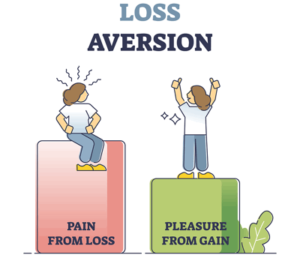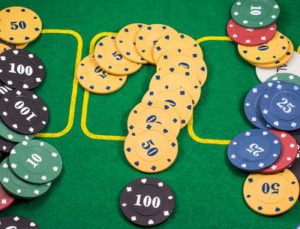 Before reading this article, ask yourself the following question: do you prefer to win money or to win bets? That might sound like a daft question, given the fact that winning bets would surely lead to you winning money. However, the reality is that it is entirely possible to win 60% of your wagers but still lose money, just as it is possible to lose 60% of your bets and win money. It is all about the types of bets that you place, which determine the sort of bettor that you are. Being loss averse might actually mean that you bet badly.
Before reading this article, ask yourself the following question: do you prefer to win money or to win bets? That might sound like a daft question, given the fact that winning bets would surely lead to you winning money. However, the reality is that it is entirely possible to win 60% of your wagers but still lose money, just as it is possible to lose 60% of your bets and win money. It is all about the types of bets that you place, which determine the sort of bettor that you are. Being loss averse might actually mean that you bet badly.
The perfect example of what we’re talking about can be found with slot machines. Some will pay out little and often, whilst others will not pay out regularly but when they do the prize will be much bigger. Which type of machine would you prefer to play on? If you think that the little and often strategy is best, the likelihood is that you’re a loss averse kind of person and would actually prefer to win bets than you would win money. Obviously we’d all probably consider winning both money and bets is the best way forward, but is that true?
How Loss Aversion Manifests
 The idea behind loss aversion is a simple enough one to understand: you don’t want to lose your bets. How this actually manifests is interesting and will differ from person to person. The most obvious example is of people that place bets on wagers with incredibly low odds, meaning that they’re as good as guaranteed to come in. This might seem like an entirely sensible strategy, but when you consider that the payout will be minuscule it then becomes a question of whether or not it was even worth placing the bet in the first place.
The idea behind loss aversion is a simple enough one to understand: you don’t want to lose your bets. How this actually manifests is interesting and will differ from person to person. The most obvious example is of people that place bets on wagers with incredibly low odds, meaning that they’re as good as guaranteed to come in. This might seem like an entirely sensible strategy, but when you consider that the payout will be minuscule it then becomes a question of whether or not it was even worth placing the bet in the first place.
For the bettor, they’re happy to see that their wager is a winning one, not thinking about the amount of money that they’re going to be paid out. In truth, it would make more sense to make a slightly riskier bet that stands a chance of winning more money than to continually place wagers that don’t really see you winning much money. The problem is, for the people placing the bet, winning it is more important than winning the money associated with betting, so they’re unlikely to change the way that they think about betting.
Another good example is of the person at the casino that places lots of small bets that will win small amounts of money fairly regularly, but will see them lose in the long-run. You can often see this from people that play on the slot machines in casinos. They will bet, say, ten pence per spin, winning four pence back, but the idea that they’re ‘winning’ their bet will make it all worth while. The fact that they will end up losing their money the longer that they play doesn’t really occur to them because they’re just happy with the small-time wins.
Hating To Lose

The whole point of loss aversion comes from the idea that people hate to lose more than they enjoy winning. As a result of this, losses affect us more than wins do and so we try to avoid losing whenever possible. The work of Daniel Kahneman and Amos Tversky shows us that most people have a loss aversion ratio of between 1.5 and 2.5. In other words, a loss is thought of as being just as bad as a win that is up to 2.5 times the size is good. The obvious question to ask is how this might be affecting us in the manner in which we bet.
Professional gamblers don’t mind losses. Whilst they would obviously rather never lose, those that bet professionally accept that losses are part of the game. They look at what the loss means to their overall bottom line, rather than allow it to have an affect on them emotionally. Given that one of the best things that you can do when placing bets is to think like a professional, it is worth bearing this in mind when you’re weighing up your wins versus your losses. Do not allow yourself to be dragged down by emotional baggage.
Why It Matters
 It is not unreasonable to ask why loss aversion actually matters. After all, not losing is a good thing, isn’t it? In reality, loss aversion can put us in a situation where we make terrible choices. We look at two options and tend to take the one that is extremely risk averse, pushing us away from the possibility of winning more money. This can be seen in people that are given the choice between a small but definite gain and a large gain that might also result in a large loss. The large loss looms large in their minds, so they take the small definite win instead.
It is not unreasonable to ask why loss aversion actually matters. After all, not losing is a good thing, isn’t it? In reality, loss aversion can put us in a situation where we make terrible choices. We look at two options and tend to take the one that is extremely risk averse, pushing us away from the possibility of winning more money. This can be seen in people that are given the choice between a small but definite gain and a large gain that might also result in a large loss. The large loss looms large in their minds, so they take the small definite win instead.
Someone that has already lost money will try to win that money back rather than cutting their losses. This can be problematic because it can end up being the definition of ‘throwing good money after bad’, with the punter in question so loss averse that they’ll try anything to turn the loss around. Whilst they’re doing this, of course, they fail to realise that they’re actually just losing even more money and chasing a lost cause. This is exactly the sort of situation that we should try to avoid getting ourselves into as often as possible.
Think Through Your Strategy
 If you’ve been paying attention to what we’ve written on other pages on this site, you’ll know that we’re keen believers in the idea of having a solid betting strategy. One of the best ways of doing this is by doing as much research as you can into what you’re betting on. If you do this then you’ll be in a situation where you can ensure that your strategy is likely to be a winning one over time, especially when you’re able to find value in the market.
If you’ve been paying attention to what we’ve written on other pages on this site, you’ll know that we’re keen believers in the idea of having a solid betting strategy. One of the best ways of doing this is by doing as much research as you can into what you’re betting on. If you do this then you’ll be in a situation where you can ensure that your strategy is likely to be a winning one over time, especially when you’re able to find value in the market.
Imagine for a moment that you’ve done a wealth of research into Manchester City and you know that they average over ten corners per match. Bookmakers tend to undervalue the Over / Under market on corners, so they offer relatively long odds on City to get more than ten corners in their games. You place a bet on the Over 10.5 Corners to City market for the next five matches, knowing that there is a strong possibility that you’ll lose four of those bets. The good news is that if you win one of them then your winnings will more than cover your losses.
This sort of bet demonstrates that you trust you own strategy and that you’re confident that your research is going to prove to be valid in the long-run. You don’t get scared by the potential losses and steer away from an approach that you believe will see you win more money than you lose. That is what we’re talking about when we say that research is important and that having a betting strategy is key to winning money and being a successful bettor. The temptation to move away from lose bets is strong, but knowing that you’re betting on an undervalued market is key.
Another option is to place ante-post bets, bets on future events. These can be more rewarding because you have longer to wait for the outcome and this can allow anticipation to build. In fact, many people get more emotional reward form the anticipation of a bet than the actual outcome. Therefore placing bets in advance on something like the winner of the Premier League before the start of the season can mean you can enjoy each round of games without needing to bet on each individual match. Because the bet takes longer too you are more likely to be rational about it and if it loses in the end you will probably come to terms with it more easily.
The Link To Gambling Problems
 There is evidence to suggest that there is a link between loss aversion and developing a gambling problem. This might seem counter-intuitive, but when someone is keen to avoid losses, they can often place many bets that are ‘winners’ but that will see them losing money over a longer period of time. This, in turn, can lead those same people to throwing good money after bad, as mentioned before, meaning that they suddenly find themselves in a situation where cutting their losses would have made more sense than trying to win lost money back.
There is evidence to suggest that there is a link between loss aversion and developing a gambling problem. This might seem counter-intuitive, but when someone is keen to avoid losses, they can often place many bets that are ‘winners’ but that will see them losing money over a longer period of time. This, in turn, can lead those same people to throwing good money after bad, as mentioned before, meaning that they suddenly find themselves in a situation where cutting their losses would have made more sense than trying to win lost money back.
There is no hard and fast rule when it comes to avoiding being the victim of loss aversion. All you can do is to constantly question yourself, asking whether the decision that you’re making is one that is designed to see you win or to avoid losing. If it is the latter then you will need to think long and hard about what you can do to stop yourself from being so afraid of losing, which is perfectly fine as long as you win in the long-run. This is why having a bankroll is so beneficial, rather than moving money into and out of your bank account every time you bet.
If you have a bankroll and you keep track of your profit and loss column, you’ll be well-positioned to ensure that you know what you’re doing with your money. Being able to see in black and white that you’re in profit, for example, will give you the will power to carry on following the same strategy, even when it involves you losing bets regularly. Equally, seeing that you’re losing money, where, when and how you’ve lost it will allow you to walk away and cut your losses rather than carry on following a losing strategy.
